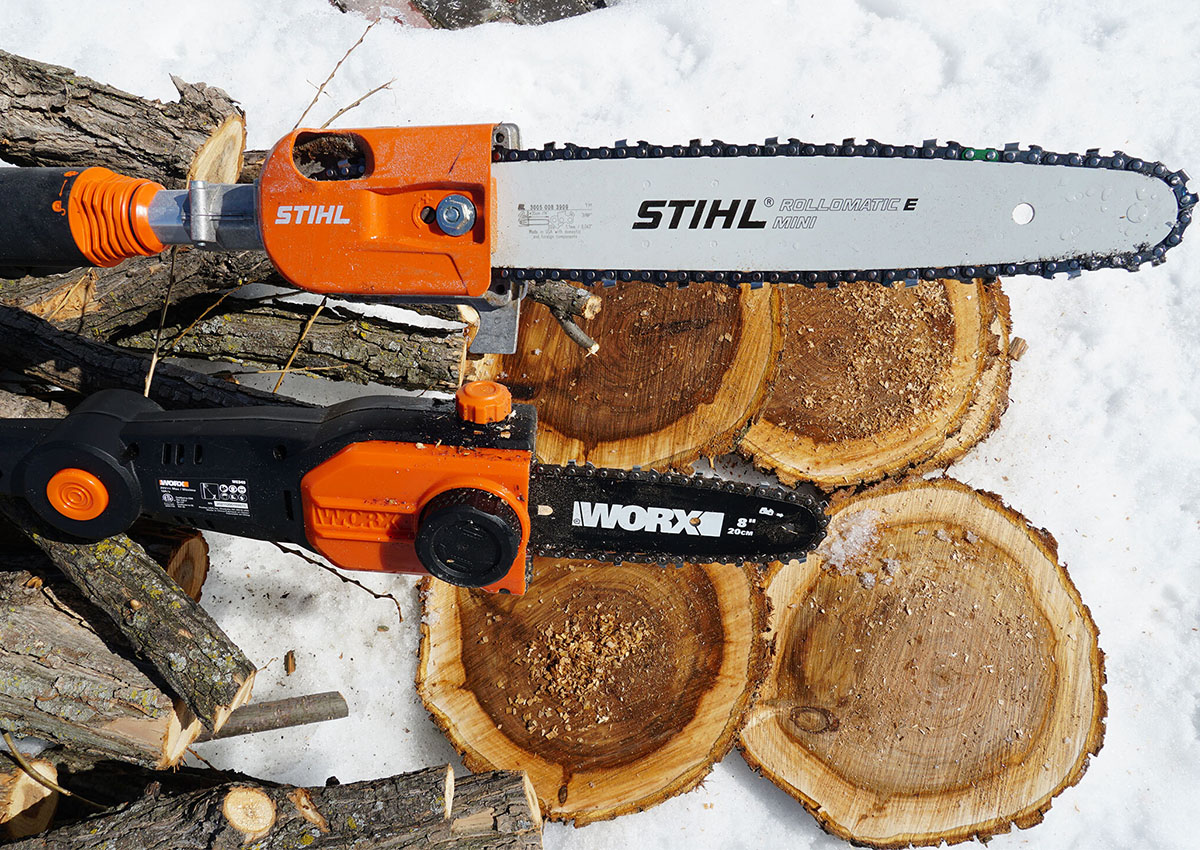We may earn revenue from the products available on this page and participate in affiliate programs. Learn More ›
A good pole saw inspires you to find jobs for it. Having perfectly trimmed shooting lanes at deer camp will be so pleasing that you’ll want to knock down those low-hanging branches in the front yard when you get back home. Then you’ll want to cut those dead limbs on the oak tree in the backyard. Soon you’ll be over at the neighbor’s cutting back branches overhanging his garden. And good for you, his tomatoes obviously didn’t get enough sun last year.
The best pole saws come in a variety of sizes and designs suited for all types of different jobs. There are hefty gas powered saws for taking down big limbs that are high off the ground, and ultralight packable saws for deer hunters to stow in their packs and stealthily take down branches while in their stand. Below are a few of the best options in each category.
How We Picked the Best Pole Saws
For this review I picked saws that I’ve used through the years of hunting private land in Wisconsin and owning a small property in Minnesota. I also picked saws that have very different designs, strengths, and prices. In general, the more power and height you want in a pole saw, the more you are going to have to pay. If you have a large forested property, it makes sense to get a gas powered saw. If you have a small property with only a few trees, a standard manual pole saw should work just fine.
No matter what job you’re trying to accomplish (even professional tree work) one of these saws will fit your needs.
Best Pole Saws: Reviews and Recommendations
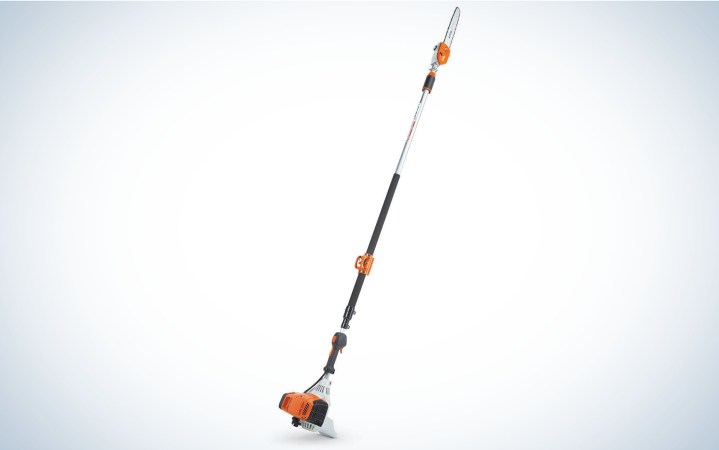
See It
Key Features
- Length: 12.8 feet
- Weight: 17.4 pounds
- Guide Bar Length: 14-inches
- Price: $770
Pros
Cons
This badass pole saw was designed for landscape and tree service professionals, but it’s also available to the consumer market. It has a telescoping shaft that’s square in shape, so there’s less flex when fully extended. With a 14-inch guide bar, and a 36.3cc engine, this saw can take on large limbs. I used it to cut through 6-inch-diameter poplar branches, which the saw handled with ease. Adjusting the pole length is easy; twist a knob near the guide bar and extend or collapse the pole. Stihl says you can cut branches up to 16 feet off the ground with this saw.
There are only two things not to like about this pole saw: its price and its weight. At $770 this saw is quite an investment. But if you’re going to be doing a lot of tree work every year, it’s worth it. Know that this is a hefty saw. Running a 17-pound pole saw for a few hours will tire you out, but you’ll get an incredible amount of work done in the process.
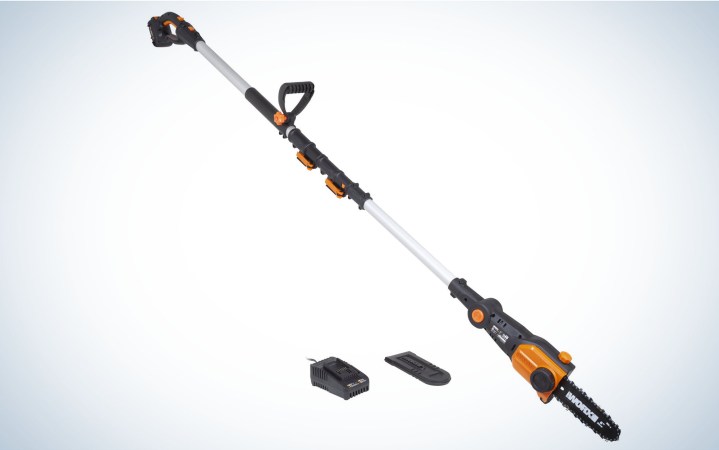
See It
Key Features
- Max Length: 13 feet
- Weight: 8.8 pounds
- Guide Bar Length: 8 inches
- Price: $170
Pros
- Affordable
- Adjustable chainsaw head and handle
Cons
This is a handy and affordable electric pole saw that will handle light and medium duty work around the yard or at hunting camp. It’s a light saw so it’s easy to lift to reach higher branches. The 20v battery delivers enough power for the saw to easily rip through 4-inch and 5-inch diameter branches. The battery drains relatively quickly, so if you plan on doing a day’s worth of work with this saw, it would make sense to get a second battery, which costs about $100.
One nice feature about this pole saw is that both the saw head and handle are adjustable, so you can set different angles for the bar and the handle depending on the angle at which you need to cut.
The only ding I have on this saw is that the chain tends to come loose after sawing through about a dozen branches. The automatic, tool free tensioning system didn’t secure the chain as tightly as I wanted. I was able to unscrew the whole thing (after first removing the battery) and then get the chain to tighten properly.
Read Next: Best Electric Chainsaw
Most Affordable: Fiskars Extendable Tree Pruner and Pole Saw
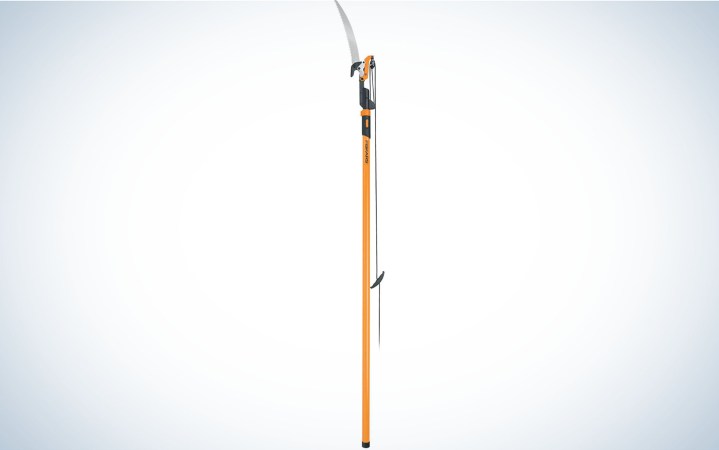
See It
Key Features
- Max Length: 16 feet
- Blade Length: 15 inches
- Weight: 5 pounds (approx)
- Price: $130
Pros
- Affordable
- Chain drive provides more cutting power
Cons
- Lots of flex in pole at full length
This is a pretty typical pole saw with one nice feature: it has a chain drive to provide more cutting power to its steel pruner. Fiskars says it provides three times more power than the standard pruner and you can cut branches up to 1.25 inches in diameter with its chain-driven pruner. That’s actually a decent sized limb. For larger branches, the 15-inch cutting blade has aggressive teeth and a hook at the end to prevent it from slipping out of the cut. The locking mechanism for the telescoping pole prevents the pole saw from pulling apart while sawing bigger branches—which is a common problem with cheaper pole saws. This is the longest saw in the review, and it can reach branches high off the ground, however you’ll notice a good amount of flex in the pole at max height. That makes cutting a challenge.
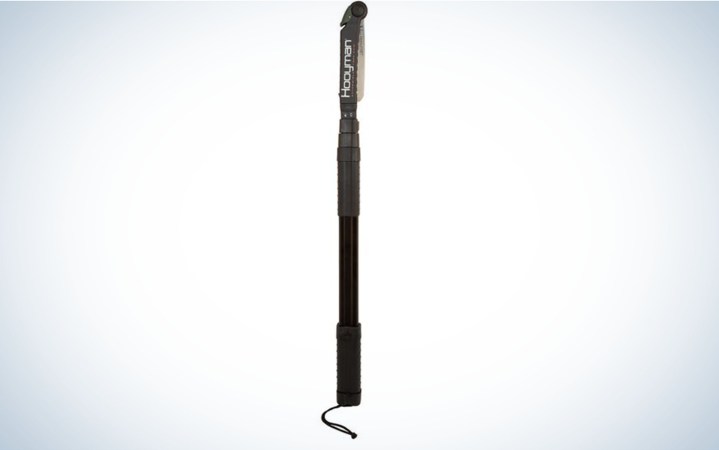
See It
Key Features
- Max Length: 10 feet or 5 feet
- Folded Length: 28 inches (10 foot model) / 12 inches (5-foot model)
- Weight: 1.55 pounds (5-foot model)
- Price: $55 (5-foot); $90 (10-foot)
Pros
- Light, packable, and portable
Cons
If you’ve got to trim shooting lanes well off the trail, you need a collapsable, packable saw like the Hooyman. There are two versions of this saw: a 10-foot model that collapses down to 28 inches or a 5-foot model that collapses down to just 12 inches. The 10-foot model is great for clearing lanes before the season. You could easily stash the 5-foot model in your hunting pack, so when you climb into your stand only to notice there’s a limb blocking the main trail, you can stealthily saw it down. This is an ideal tool for hang-and-hunt bowhunters who might have to clear only a branch or two for their treestand setup.
The saw part is removable, so you can use it as a handsaw if you like. The Megabite teeth on the saw are super aggressive and chew through branches quickly.
FAQs
Quite simply, it’s a saw at the end of a pole. Pole saws are used to cut branches at height. Never (ever), use a ladder and chainsaw to cut branches or limbs.
The first thing you should do is throw on some safety gear. Eye protection and gloves at a minimum, but a forestry helmet with a face shield is even better. You’re going to be cutting branches above your head, so there’s a good chance saw dust and debris will fall toward your face while you’re looking up. Then make sure you can reach the branch you want to cut without standing directly beneath it—you will not be able to move out of the way quickly enough when the branch begins to fall. Then begin to cut from the top of the branch. Gravity pulling the branch down will keep your blade from getting pinched. Make your cut close to the tree so the branch doesn’t flex as much.
The Stihl HT 135 is one of the fastest, most powerful, and most capable pole saws on the consumer market. It’s quite expensive.
Final Thoughts on the Best Pole Saws
There are a ton of pole saws out there and all of them will work on simple jobs around the yard. However if you have more serious work that needs to be done, like cutting shooting lanes deep in the woods or trimming large limbs on a heavily forested property, then you need a specialty tool. One of the pole saws in this review will get the job done.
Read the full article here

